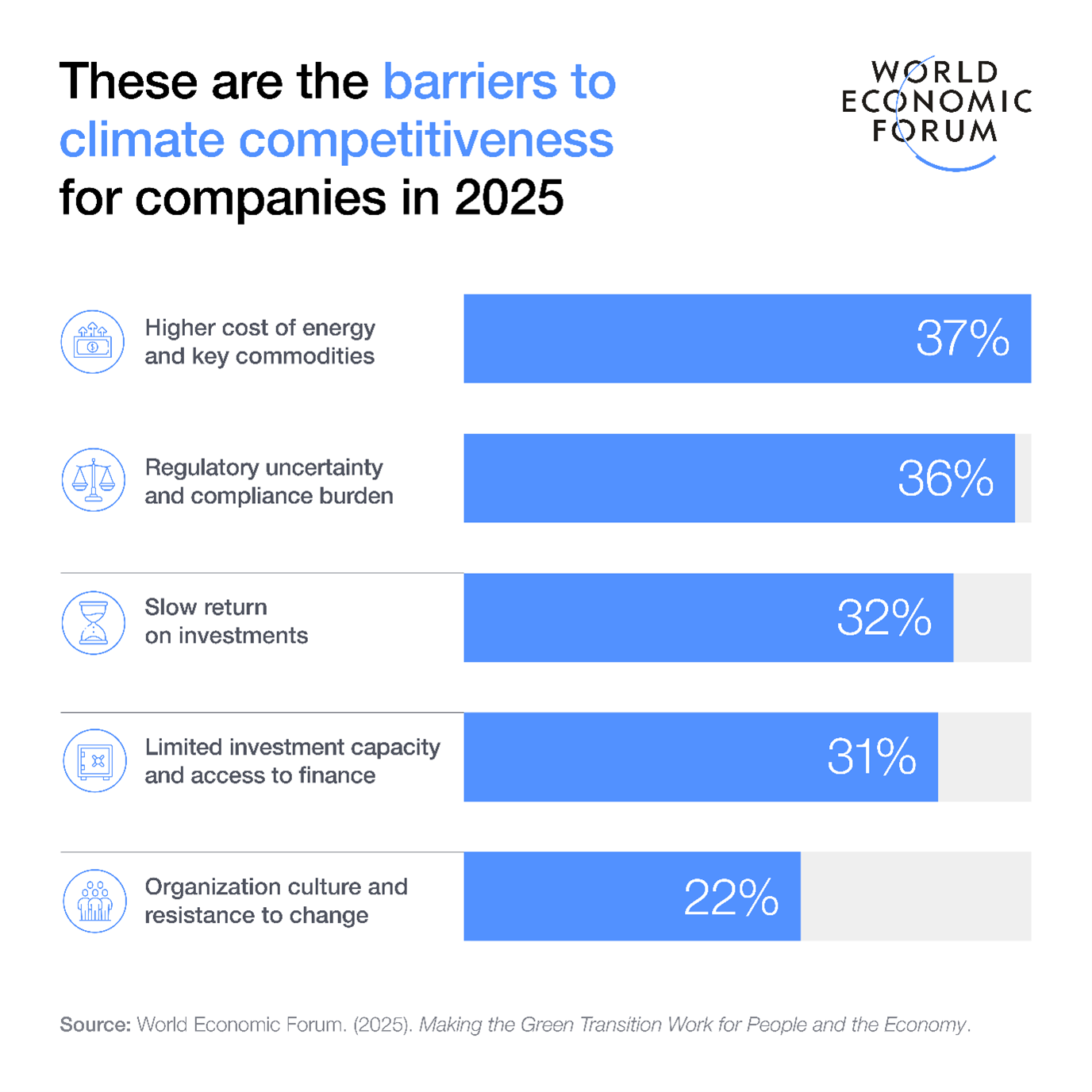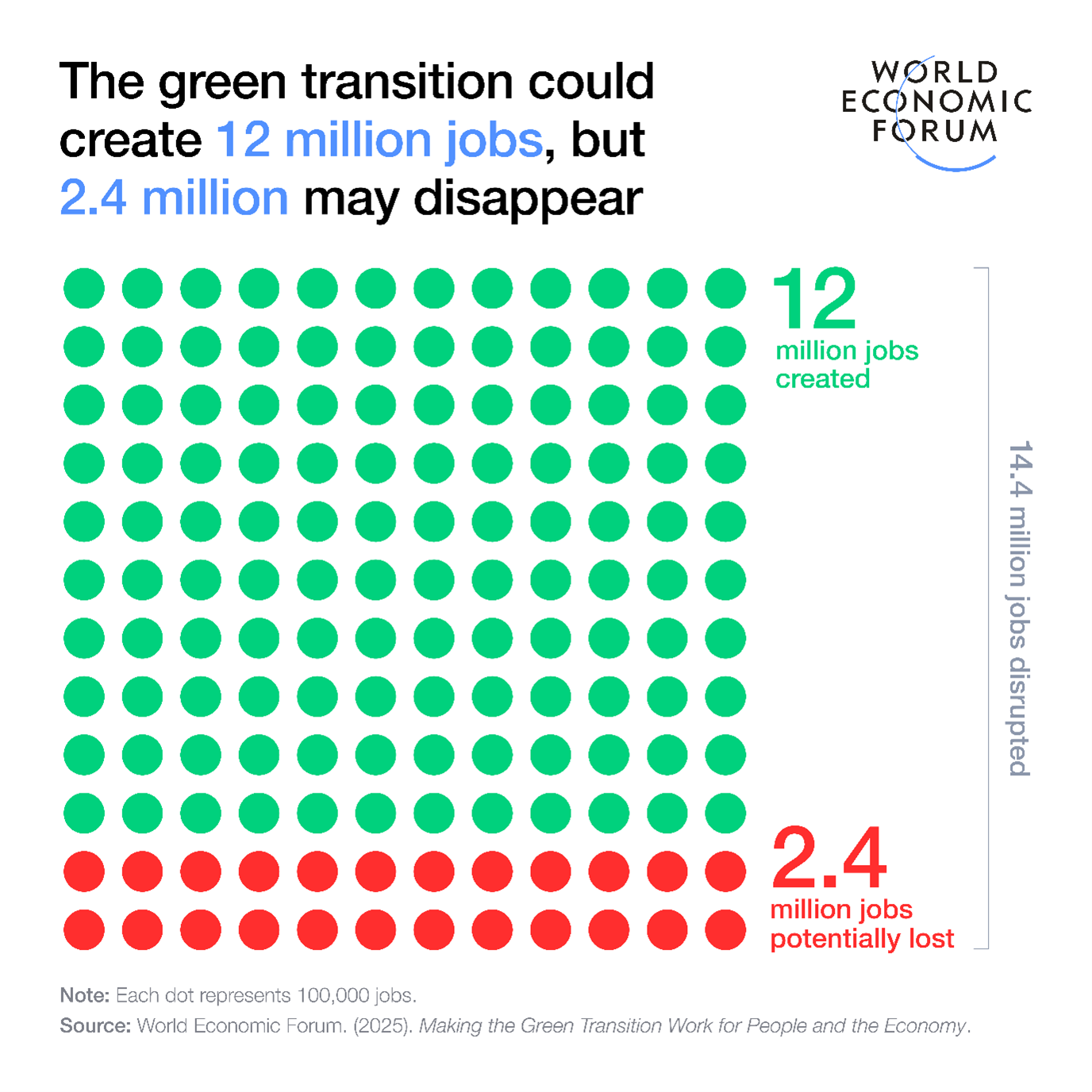- 14.4 million jobs will be impacted globally, with five new jobs created for each one phased out; 33% of businesses are concerned about job displacement in their country.
- Higher energy costs and regulatory burdens are hindering economic competitiveness, as green finance and technologies remain unevenly distributed both within and between countries.
- Businesses can contribute to making the green transition work by embedding social and economic factors across different components of their climate strategy.
- Read the report here .
Geneva, Switzerland, 14 November 2025 - The green transition is expected to impact 14.4 million jobs globally by 2030, with a net gain of 9.6 million new roles despite 2.4 million being phased out, according to a new World Economic Forum report released today.
While business leaders in more than 80% of countries anticipate an overall economic boost, geopolitical fragmentation, economic uncertainty and deepening societal divides are challenging traditional climate-mitigation approaches and heightening the risk of uneven impacts on workers, consumers and businesses within and across countries.
The Making the Green Transition Work for People and for the Economy report - developed in collaboration with McKinsey and Company and with the support of the Laudes Foundation - provides new country-level data and guidance to help businesses embed socioeconomic considerations into their transition and sustainability strategies. Its release comes as countries meet in Belém for COP30, where discussions are placing unprecedented emphasis on the societal and economic implications of the green transition and the importance of human development.
"Effective climate action depends on understanding the unique socioeconomic realities of each country and local community," said Attilio Di Battista, Head of Economic Growth and Transformation, World Economic Forum. "By leveraging new data and practical guidance, we can adapt climate strategies to ensure the green transition works for people and the economy."
Key findings
Companies are struggling to stay competitive in the green transition and warn of spillover effects for consumers. Globally, 37% of businesses (and 47% in low-income economies) report rising energy and commodity costs, while 51% are concerned that some of these increases may be passed on to consumers, making key goods and services less affordable.
"In the rapidly evolving societal and geoeconomic context, businesses that want to transition successfully should explicitly consider the impact of their climate plans on people," said Harsh Vijay Singh, Head of Equitable Transition, World Economic Forum.

Access to capital and financing for the green transition is expected to remain uneven within and between countries. Overall, 32% of businesses - and 49% in low-income countries - cite limited investment capacity and access to finance as barriers to staying competitive. Globally, 80% of executives surveyed identified unequal access to green financing among companies as a significant risk in at least one industry in their country, a concern strikingly consistent across income levels.
The green transition risks creating new technology divides. Although many governments are scaling up industrial policy efforts in the energy and green sectors, access to technologies and capacity may not accrue evenly between countries. Businesses in lower-middle- and low-income economies face higher challenges when it comes to access to green technologies, supply chains for sustainable products and green skills. More than one out of five companies lacks access to green technologies in lower-income economies. By contrast, almost 40% of businesses in upper-middle- and high-income economies face increased regulatory uncertainty and compliance burden.
In addition, one out of three businesses globally are concerned about job displacement in at least one major industry in their country. Even in countries where the green transition is expected to yield gains, significant labour market disruptions are anticipated. The research finds that higher levels of social protection and other long-term, socioeconomic foundations are associated with lower levels of concerns around the impact on workers and consumers.

Country highlights
Structural socioeconomic conditions that will help make the green transition work for people and the economy differ within and across income levels, requiring a shift beyond traditional distinctions between advanced and developing economies. Six archetypes of countries with similar risks and opportunities are analysed in the report, including key findings for the G20 and the 10 most populous countries in the world.
- Inclusive green adopters (e.g. Australia, France, UK): Advanced economies with strong service sectors, greater access to financing and solid social systems. Early adopters of green technologies show concerns around higher regulatory burden and energy costs.
- Green developers (e.g. China, Germany, Japan, South Korea, USA): Industrialized leaders in green technologies and yet with higher levels of per capita emissions. They benefit from deep financial markets but are grappling with uneven access to critical materials.
- Emerging green adopters (e.g. Italy, Türkiye): Industrial and manufacturing economies with strong talent bases and moderate investment constraints. Businesses in these countries tend to be more pessimistic about the economic impact of the green transition.
- Growth economies (e.g. Brazil, India, Mexico, South Africa): Rapidly industrializing nations balancing green investments with energy affordability and access challenges. Financing constraints and nascent technology ecosystems challenge the scale-up of new green sectors.
- Fossil fuel exporters (e.g. Saudi Arabia): Economies where fossil fuels represent a large share of GDP and public revenues. Some have ambitious transformation plans, but face slow returns on investment and low access to green skills and technologies.
- Frontier economies (e.g. Bangladesh, Nigeria, Pakistan): Low-income nations facing acute financing, skills and affordability barriers, requiring international support to align climate and development goals.
A new approach to corporate climate action
The report helps corporates identify and address socioeconomic risks and opportunities, outlining key considerations and guiding questions to support decision-makers in integrating these factors into climate strategy. It is not intended, however, as a comprehensive guide for developing corporate climate plans.
"As the world moves forward on climate action, leaders will need a clear view of the socioeconomic impacts of the transition on people and communities," said Hemant Ahlawat, Senior Partner and Co-leader of McKinsey Sustainability. "Building on insights from McKinsey's Climate Transition Impact Framework, these findings aim to help companies across sectors embed social and economic considerations into their strategies to drive growth that is both sustainable and inclusive."
The report builds on previous tools and frameworks developed by the World Economic Forum's Equitable Transition Initiative . Its findings will inform country-level action taken forward through the Accelerators Network , and will support businesses in making their green transition strategies work for people and the economy.






